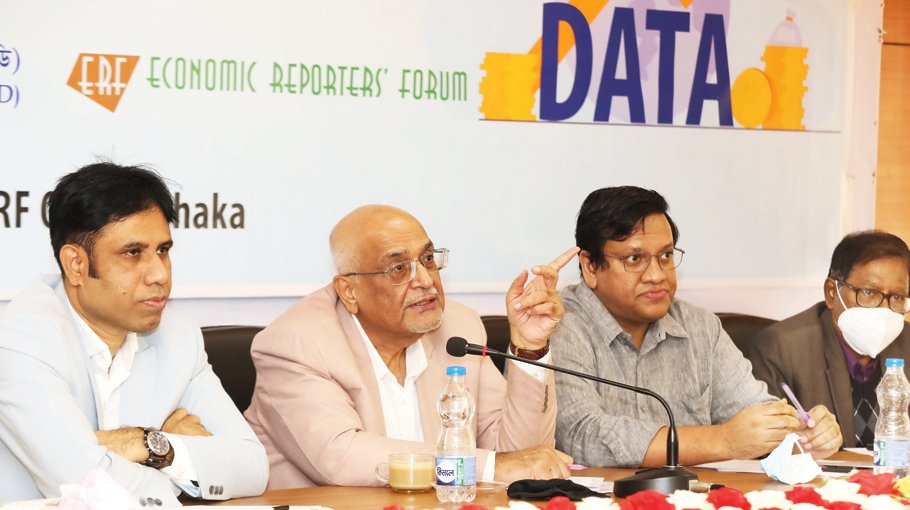LDC graduation shoots demand for Bangladesh financial info up
Dr Debapriya tells discussion of ERF, CPD, Asia Foundation

"Since Bangladesh is now on the way towards graduation from the LDCs, such country needs to have “trigger indicator” to avail support from the international community if it faces any challenge beyond graduation", said distinguished fellow of the Centre for Policy Dialogue (CPD) Dr Debapriya Bhattacharya on Tuesday
He said the situation of graduation from the LDCs by Bangladesh has increased the demand for financial information by 100 times. Although the matter is acknowledged verbally, but no such action is still evident.
Dr Debapriya, also the member for UN Committee for Development Policy (CDP), made the remarks while addressing a discussion meeting on Tuesday on the use of financial information and right to information towards ensuring transparency and accountability.
He said after LDC graduation, sufficient support would not be available if there is no timely supply of full-fledged information. It will also tarnish the image of the country.
Mentioning that “Information Blindness” has been prevailing in the country, he said either the government or the concerned authorities could not be able to perceive that information could be a supporting force.
“There is also a lack of modern mindset on effectiveness of information towards optimum utilization of limited resources which is also not consistent with the moderate world,” he added.
The country’s eminent economist also opined that even such dearth in information and data is also not consistent with the development desire of the country as well as its efforts to ensure recovery from the pandemic, attaining the SDGs by 2030 and thus becoming a prosperous developed country by 2041.
Organized jointly by the Asia Foundation, CPD and the Economic Reporters’ Forum (ERF), senior research fellow of CPD Towfiqul Islam Khan made the key-note presentation at the meeting held at the ERF office in the capital’s Paltan area.
Moderated by ERF general secretary SM Rashidul Islam, its executive committee member and former Bureau chief of Reuters Sirajul Islam Qadir gave the welcome remarks.
The distinguished fellow of CPD said that financial information is the cornerstone of macro economy while there is also a historical importance of information in formulating financial policies. He said whenever there was less demand in the economy, the government then had created demand through boosting expenditure.
During the COVID-19 pandemic, the renowned economist said the global production and supply chain was halted which led to the decrease in demand. Under the circumstances, the governments had to increase expenditure, especially to the lagging behind communities, through various support measures.
He said it was a matter of surprise that there was no lack of fund for the government of Bangladesh although there was dearth in funding for various countries of the world. “But, the main problem for Bangladesh was to spend that fund. It was not possible to reach the amounts of the stimulus packages to the targeted Beneficiaries. Although the a2i project helped a lot in digitalization, but it could not help to detect the area-wise infection trend of the pandemic,”
Dr Debapriya said even the public representatives were not fully aware of the fact as to what was the overall stimulus package amount, who were the recipients and how much amount was disbursed. It was not possible to disburse even 20 percent of the Taka 2,500 cash support (Eid Gifts) to each beneficiary due to lack of data and information. The government does not have any split information to face institutional and other problems.
In his key-note presentation, Dr Towfiqul Islam Khan said that the necessary data and information for framing budget and determining deficit financing are not available from the different government offices. As a result, Bangladesh is lagging behind day by day in open budget index as the country’s score has declined to 36 in 2019 from 56 in 2015. The latest score of the country has stood at 42. This indicates that the position of Bangladesh has downgraded a bit in terms of information.
Dr Towfiqul said that the Finance Division often shows less revenue collection than the National Board of Revenue (NBR) and such gap has been widened compared to the past.
He said there is no such estimation as how much the government is providing in the name of incentives through tax exceptions. But, such estimation is made in other countries ahead of the budget.
The journalists who were present in the day’s discussion also highlighted the problems that they often face in getting information from government offices.



